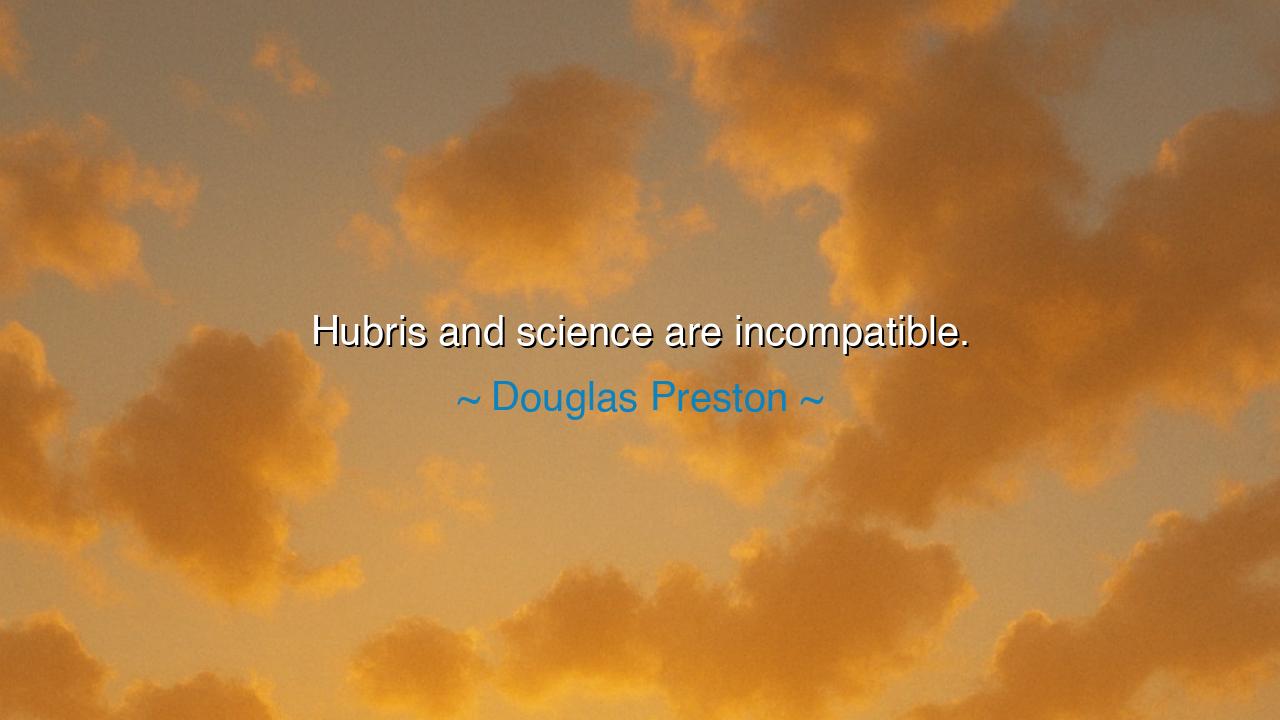
Hubris and science are incompatible.






"Hubris and science are incompatible." These words by Douglas Preston strike to the heart of a timeless truth: that hubris—an excessive and dangerous pride—has no place in the pursuit of science. Science, at its core, is about humility, about recognizing that we are merely seekers in the vast, unknowable expanse of the universe. It is the pursuit of truth, the constant questioning and testing of our beliefs, and the willingness to accept that we may be wrong, even when we believe we are right. Hubris, on the other hand, arises from the belief that we already know it all, that our understanding is complete, and that we stand above the very mysteries we seek to unravel.
In the ancient world, the Greeks understood the dangers of hubris well. Hubris, the excessive pride that leads one to think they are above the gods or the laws of nature, was seen as the precursor to downfall. The gods themselves, in their infinite wisdom, punished mortals who dared to elevate themselves above the natural order. Sophocles, in his tragic play Antigone, showed how the king Creon’s hubris led him to defy divine law, resulting in tragedy and death. Similarly, Icarus, in the famous myth, flew too close to the sun with his wax wings, driven by his belief that he could defy nature. The gods punished him for his hubris, and he fell to his doom. These stories were not merely moral lessons but were reminders that in the pursuit of knowledge and power, one must not lose sight of humility and respect for forces greater than oneself.
This ancient wisdom is echoed in Preston's assertion that hubris and science are fundamentally at odds. Science, when practiced with true integrity, requires humility—a willingness to accept that no matter how much we know, there is always more to discover, always unanswered questions, and always room for improvement. When a scientist becomes consumed by hubris, believing their knowledge to be absolute or beyond reproach, they stop questioning, stop seeking, and become blinded to new possibilities. The scientific method itself—the foundation of all scientific inquiry—is built on the principle that our knowledge is provisional, that our theories must always be tested and re-tested, and that we must remain open to new data that may challenge our previous understandings.
A prime example of hubris in science can be found in the history of medical research. In the early 20th century, many believed that vaccination and antibiotics had essentially conquered disease. Scientists, filled with pride in their achievements, began to assume that modern medicine could solve all of humanity’s problems. But this hubris led to a failure to prepare for future threats, like the AIDS crisis in the 1980s and the rise of antibiotic-resistant bacteria. What these scientists failed to recognize, as Preston warns, is that science is an ever-evolving field. The hubristic belief that all the answers were already known blinded the scientific community to the new challenges that arose, showing how arrogance in knowledge can lead to ignorance of future dangers.
The lesson from Preston’s words is one of caution and humility. Science, like any noble pursuit, must be approached with respect for its complexity and the uncertainty that lies at its core. To believe that we, as humans, can ever fully master the secrets of the universe is to invite our own downfall, just as the ancient stories warned. True scientists, like the great minds of the past—Newton, Einstein, Curie—approached their work with awe, wonder, and an understanding of the vastness of the unknown. They knew that their discoveries were but stepping stones in the endless pursuit of knowledge. This humility is the true spirit of science.
In our own lives, we must take Preston’s warning to heart. Whether in science, medicine, politics, or personal relationships, we must guard against the lure of hubris—the temptation to believe that we know all there is to know, that we have all the answers. We must strive to remain open-minded, to recognize that our understanding is always limited, and that true growth comes from embracing uncertainty and curiosity. By doing so, we will avoid the perils of overconfidence and stay on the path of growth, continually refining our beliefs and actions as we seek truth in all aspects of life.
Finally, let us remember that the pursuit of knowledge and truth is not a race to finish but a journey—one that requires patience, reflection, and, above all, humility. Whether we are striving to uncover the mysteries of the universe or working to understand our place in the world, we must approach each question with the awareness that we are never finished, never perfect, but always learning. Hubris can blind us to the wonders of discovery and the joy of continuous learning. To walk the path of knowledge with humility, then, is to walk the path of wisdom itself.






AAdministratorAdministrator
Welcome, honored guests. Please leave a comment, we will respond soon